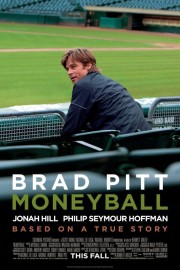Moneyball
**I wrote a 10-year anniversary piece on “Moneyball,” and its place in the underdog sports genre, for Next Best Picture that can be read here.
This film could have been your typical “underdog sports movie.” Worse, it could have been “Major League.” Thankfully, “Moneyball” spends less time on the field and more time in the offices, as Oakland A’s GM Billy Beane tries to form a championship team on a minuscule budget– well, minuscule for the Majors, at least –by going against decades of strategy and going for maximum bang for minimum buck. He’s still searching for a World Series ring, but he’s reinvented the game as it’s played behind the scenes; that alone is worth cheering for.
Billy Beane was a former player, who was heavily recruited out of high school, and whom passed up a full scholarship to Stanford for his chance at stardom with the Mets. It wasn’t meant to be; his career was lackluster, as he was passed from team to team before his career ended in…Oakland. Now in his ’40s, divorced and with a 12-year-old daughter (Kerris Dorsey), he’s a rare GM who was a player, not that it means anything when his scouts and coaches are telling him the same things, and focusing on the same intangibles, they always have. He gets a wake up call when he’s in Cleveland looking to deal for a player, and he gets shot down after a young man, Peter Brand (Jonah Hill), whispers something to one of the coaches’s ears. Turns out Brand is a recent Yale grad with a degree in economics, who has some wild ideas, first put forth by a man named Billy James, about what matters most when evaluating players (with his ability to get on base taking top priority). Beane is interested, and he hires Pete away from Cleveland, and tries to figure out a way to compete with teams like the Yankees and the Red Sox without breaking the bank.
I haven’t read the 2003 book by Michael Lewis that this film, directed with delicacy and an understated energy by Bennett Miller, is based on, but I’ve heard critics of the book say that Lewis, and thus, the film, glosses over key contributions that helped the 2002 A’s tie for the best record in the AL, including going on a record-breaking winning streak, before getting ousted for the second year in a row in the ALDS. Critics can be such killjoys sometimes. As mentioned before, Miller (making his first film since his Oscar-winning powerhouse, “Capote”) and his screenwriters (a potent one-two punch of Oscar winners Steven Zallian and Aaron Sorkin) aren’t as interested in what happened on the field as they are the risks Beane took in the front office when he was forced to replace three stars, including Jason Giambi, with no money. It’s thrilling drama played to perfection by Brad Pitt (as Beane), who stayed with the movie through two other directors before Miller got on board, Jonah Hill (who is understated perfection as a young man who, at first, seems in over his head), and Phillip Seymour Hoffman (as manager Art Howe, who fights Beane tooth and nail before he’s forced into drinking the water), who guide the film through some lulls in pacing (not unlike those in a baseball game itself), and come out with a winner. It doesn’t look like other sports movies in form and content, but like its brethren, you’ll still leave the theater cheering.










